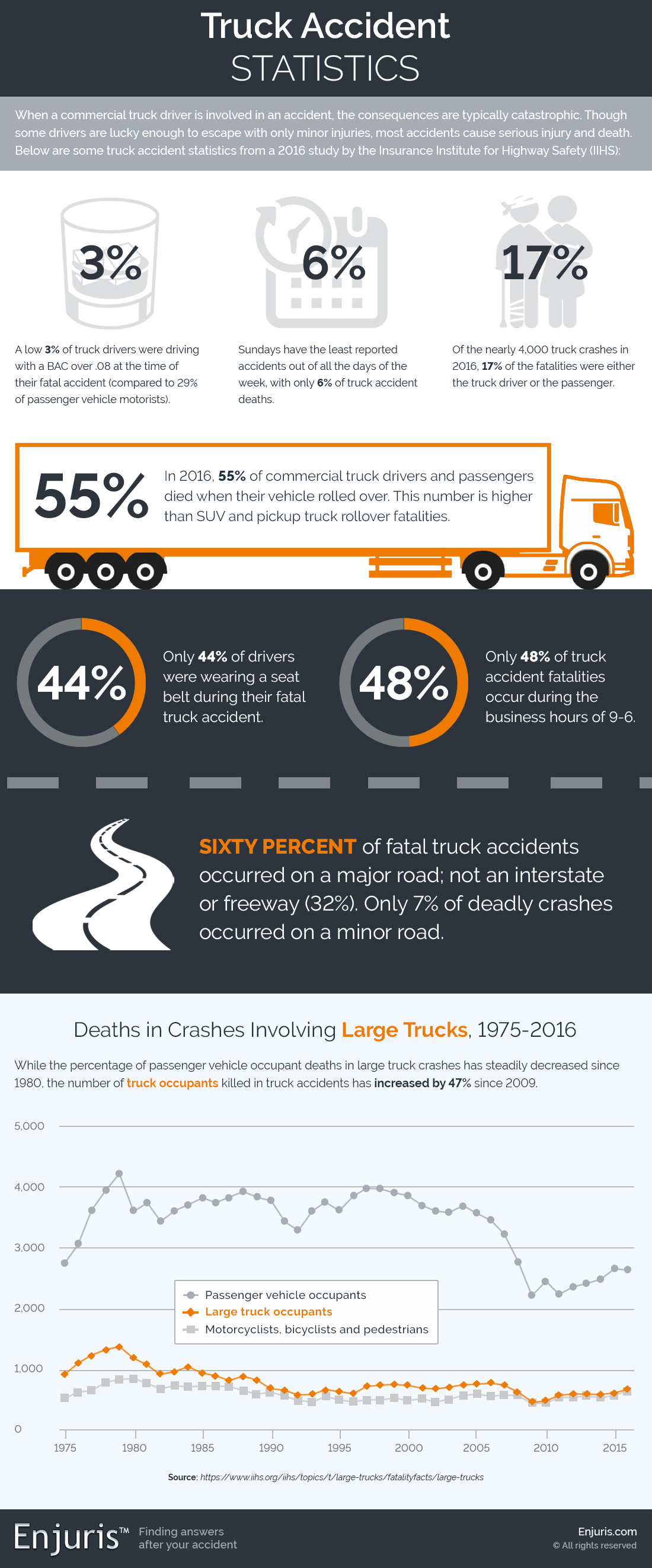
Liability and recovery for truckers hurt on the job
When you think about truck accidents, most people focus on what happens when a commercial truck causes a highway accident. The focus is often on recovering damages for the injured motorist. The injured truck driver, however, may have a workers’ compensation claim in Georgia. This article helps commercial drivers understand liability and recovery for their truck accident claim.
Truck accident statistics

Statistics on Truck Accidents
View Full Size Get the Code Use this graphic on your site
Use this infographic on your site
We encourage people to use our infographics, with proper attribution. Just copy and paste the code below to use this infographic on your site. If you need help, let us know!
<a href="https://www.enjuris.com/georgia/workers-compensation/injured-truck-driver/" target="blank"><img src="https://www.enjuris.com/infographics/2018/infographic-truck-accident-statistics.jpg" alt="Statistics on Truck Accidents" title="Statistics on Truck Accidents" style="width: 100%; max-width: 1100px; display: block; margin: 15px auto;" /></a>
The data presented above is certainly concerning for commercial truck drivers and their families. Wrongful death claims are possible depending on the cause of the accident, such as if a negligent or drunk driver was a fault. The victims’ families may also pursue a workers’ comp settlement with the employer of their deceased loved one. Consulting with a personal injury attorney will help the victim’s family learn which is the best course of action for their claim.
Vehicles driven by commercial truck drivers
Names for commercial trucks vary significantly throughout America. For legal purposes, a commercial truck driver may receive workers’ compensation if they drive any of the following vehicles:
- Delivery truck
- Commercial truck
- 18-wheeler
- Oil or gas truck
- Big rig
- Semi
- Semi-trailer
- Tractor trailer
- Box truck
- Dump truck
- Tow truck
- Refrigerated truck
- Single unit truck
- Garbage truck
- Mail truck
Though the employers and process for recovery will vary for these commercial truck drivers, especially for drivers of government vehicles, injured truck drivers are still entitled to workers’ comp regardless of the type of truck they drive.
Causes and types of commercial truck accidents
Like any other car accident or workplace accident, a variety of conditions may cause a trucker to be injured either on the job or in a crash. The IIHS lists the following as contributors to commercial truck accidents:
- Braking difficulty as trucks need to travel 20-40% farther than cars to come to a stop
- Poorly maintained brakes also make stopping on icy or wet roads difficult
- Truck driver fatigue
- Violation of the federal regulation limiting driving to 11 hours a day
With the above situations, both the truck driver and the employer can be found at fault. If brakes or driver fatigue were the cause of your truck accident, you need to speak with a workers’ comp attorney who specializes in commercial truck claims in order to learn your potential for recovering damages.
Other employment accidents that can injure truckers include:
- Slip and fall accidents
- Injuries from a criminal act, such as a robbery of the cargo
- Injuries from falling cargo
- Traffic accidents
- Injuries from lifting and loading cargo or merchandise
- Injuries while inspecting or maintaining the truck
- Carpal tunnel and other occupational injuries that come from gripping the steering wheel for long periods of time
- Back and neck pain from driving long periods
If you were injured in the above scenario or any other workplace accident, you should file a workers’ comp claim with your employer. Your employer’s insurance company should offer you a fair and reasonable settlement. If not, you can schedule a free consultation with a Georgia workers’ comp attorney.
The benefits of filing a workers’ comp claim in Georgia
Interstate truckers are a bit luckier than other injured workers in that they often have the ability to choose which state to file a workers’ claim. The benefits of filing a workers’ comp claim in Georgia include:
- Georgia allows for medical treatment for life
- Georgia isn’t a maximum medical improvement state. This means that your benefits won’t stop or be limited if you’re informed that your condition won’t improve.
- Injured truck drivers in Georgia may receive benefits for as long as they’re out of work. This allows for lengthy time off as well as lifetime benefits if the injury is permanent.
Additionally, Georgia offers the following categories for workers’ compensation benefits that include medical expenses and lost wages:
- Temporary total disability (TTD): temporary but total disability, unable to work
- Temporary partial disability (TPD): return to work with modified job duties, reduced hours and wages
- Permanent partial disability (PPD): permanent loss of function of a body part or bodily system; treating physician will assign a percentage of permanent impairment, which affects benefits
- Permanent total disability (PTD): totally and permanently disabled; benefits based on impairment rating system
Though Georgia is a desirable state in which to file your claim, your employer may have limited your workers’ compensation options. Speak with a Georgia workers’ comp attorney to learn of your eligibility.
Important reminders for workers’ comp claims
Heavy Duty Trucking (HDT), one of the top trucking publishers, discusses 3 reminders for every injured trucker with their workers’ comp claims. The reminders are:
1. Be sure to follow company policies for reporting accidents
Truckers often travel great distances and go long periods without speaking to their supervisors or managers. Though a minor accident might not seem as though it needs immediate reporting, lost time could result in less compensation or denied claims for injured truckers. External causes could be blamed for an injury, so either call or email your supervisor as soon as you can to notify them of a work-related accident. Keep track of all your conversations and documents in case you need to prove you reported your injury.
2. Understand your options for modified or light work
Depending on how close you live to your employers’ office or warehouse, there are often clerical and other positions available for you to work while you’re unable to drive your normal route. Discuss these options with your boss and be sure to receive clearance from your doctor in order to work these positions.
Don’t, however, feel pressured to work a different position if you’re too injured to return to employment. You can’t be fired for receiving workers’ comp, and you can’t be pressured to return to work sooner than you’re ready. If you feel as though your rights are being violated, speak to a Georgia workers’ compensation lawyer as quickly as possible.
3. Follow the proper protocol for returning to work
Commercial drivers may not realize that protocol needs to be followed in order to return to ordinary employment. Truck drivers need to receive clearance from their physician that states that they’re well enough to return to work. Without this permission, an injured trucker could either be negligent for performing a job they aren’t permitted to do or the driver could jeopardize their workers’ comp claim if their condition becomes worse for returning too soon.
See our guide Choosing a personal injury attorney.
